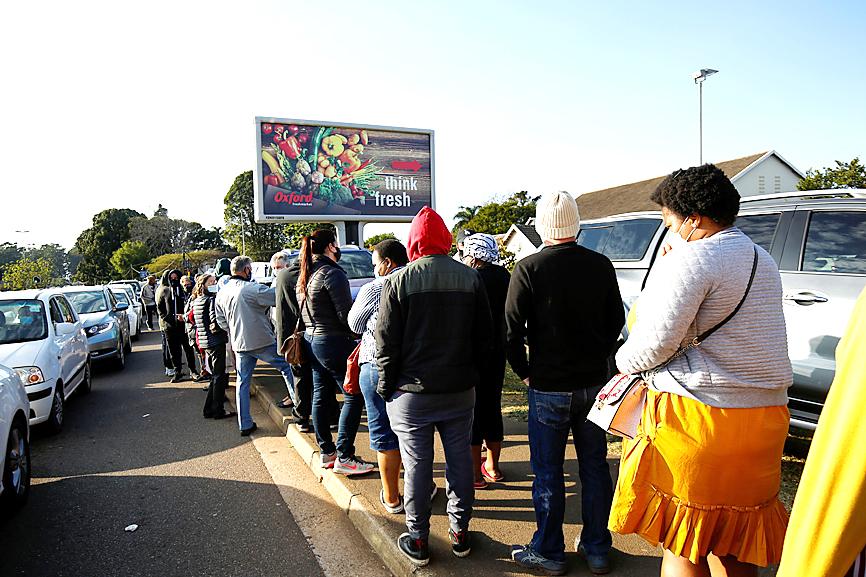South Africans are expected to face major food shortages in the wake of days of violent unrest across two key provinces, as rioters upend supply chains by looting supermarkets and torching delivery trucks.
Footage of empty or sparse supermarket shelves has been a staple of local news reports since the weekend, while chains such as Shoprite Holdings and Pick n Pay Stores have closed many outlets.
In parts of Durban, the coastal KwaZulu-Natal city at the center of the upheaval, long lines formed outside the few open food shops, and basics such as bread and milk were in short supply.

Photo: Reuters
“Food is going to be a problem because shops haven’t been open for three days and many with bulk storage have been looted,” said Gavin Hudson, chief executive officer of sugar producer Tongaat Hulett, which has suspended milling and refining operations outside the city.
“I think we are going to face some food issues in KwaZulu-Natal very shortly,” Hudson added.
The unrest started with protests against the arrest of former South African president Jacob Zuma, but soon degenerated into deadly and destructive rampages in KwaZulu-Natal and Gauteng, the economic hub.
Rioters have appropriated food, electronic goods and medical supplies from at least 800 stores, and retailers have lost an estimated 5 billion rand (US$340 million) to date, an unprecedented amount, the Consumer Goods Council of South Africa said.
More than 35 trucks have been destroyed, with a cost to logistics firms of at least 300 million rand and counting, the Road Freight Association said.
That has led to the closing of a key highway between Durban and Johannesburg, cutting off the flow of food and other essential goods from the country’s biggest port to its most populous city.
Citrus farmers are in the middle of export season and are among those unable to harvest and transport their produce, Agri SA executive director Christo van der Rheede said in an interview.
Sugarcane fields have been razed and livestock stolen, and commitments on exports that bring in crucial foreign exchange and support jobs might not be met, Van der Rheede added.
“South Africans are very fortunate to receive fresh fruit, fresh meat, fresh vegetables on a daily basis,” he said. “If these supply chains are disrupted, there won’t be fresh produce in stores.”
The food crisis is developing more than 18 months into a COVID-19 pandemic that has led to a spike in hunger around the world. As many as 811 million people — about one-10th of the global population — were undernourished last year, the UN said in a report on Monday.

POLITICAL PRISONERS VS DEPORTEES: Venezuela’s prosecutor’s office slammed the call by El Salvador’s leader, accusing him of crimes against humanity Salvadoran President Nayib Bukele on Sunday proposed carrying out a prisoner swap with Venezuela, suggesting he would exchange Venezuelan deportees from the US his government has kept imprisoned for what he called “political prisoners” in Venezuela. In a post on X, directed at Venezuelan President Nicolas Maduro, Bukele listed off a number of family members of high-level opposition figures in Venezuela, journalists and activists detained during the South American government’s electoral crackdown last year. “The only reason they are imprisoned is for having opposed you and your electoral fraud,” he wrote to Maduro. “However, I want to propose a humanitarian agreement that

ECONOMIC WORRIES: The ruling PAP faces voters amid concerns that the city-state faces the possibility of a recession and job losses amid Washington’s tariffs Singapore yesterday finalized contestants for its general election on Saturday next week, with the ruling People’s Action Party (PAP) fielding 32 new candidates in the biggest refresh of the party that has ruled the city-state since independence in 1965. The move follows a pledge by Singaporean Prime Minister Lawrence Wong (黃循財), who took office last year and assumed the PAP leadership, to “bring in new blood, new ideas and new energy” to steer the country of 6 million people. His latest shake-up beats that of predecessors Lee Hsien Loong (李顯龍) and Goh Chok Tong (吳作棟), who replaced 24 and 11 politicians respectively

Young women standing idly around a park in Tokyo’s west suggest that a giant statue of Godzilla is not the only attraction for a record number of foreign tourists. Their faces lit by the cold glow of their phones, the women lining Okubo Park are evidence that sex tourism has developed as a dark flipside to the bustling Kabukicho nightlife district. Increasing numbers of foreign men are flocking to the area after seeing videos on social media. One of the women said that the area near Kabukicho, where Godzilla rumbles and belches smoke atop a cinema, has become a “real

‘POINT OF NO RETURN’: The Caribbean nation needs increased international funding and support for a multinational force to help police tackle expanding gang violence The top UN official in Haiti on Monday sounded an alarm to the UN Security Council that escalating gang violence is liable to lead the Caribbean nation to “a point of no return.” Special Representative of the UN Secretary-General for Haiti Maria Isabel Salvador said that “Haiti could face total chaos” without increased funding and support for the operation of the Kenya-led multinational force helping Haiti’s police to tackle the gangs’ expanding violence into areas beyond the capital, Port-Au-Prince. Most recently, gangs seized the city of Mirebalais in central Haiti, and during the attack more than 500 prisoners were freed, she said.